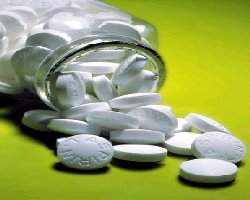A small daily dose of aspirin - 75mg - substantially reduces death rates from a range of common cancers, a study suggests.
Research at Oxford University and other centers found that it cut overall cancer deaths by at least a fifth.
The study, published in the Lancet, covered some 25,000 patients, mostly from the UK.
Experts say the findings show aspirin's benefits often outweighed its associated risk of causing bleeding.
Aspirin is already known to cut the risk of heart attack and stroke among those at increased risk. But the protective effects against cardiovascular disease are thought to be small for healthy adults, and aspirin increases the risks of stomach and gut bleeds.
However, this latest research shows that when weighing up the risks and benefits of taking aspirin, experts should also consider its protective effect against cancer.
Those patients who were given aspirin had a 25% lower risk of death from cancer during the trial period and a 10% reduction in death from any cause compared to patients who were not given the drug.
Lasting protection
The treatment with aspirin lasted for between four and eight years, but long term-follow-up of around 12,500 patients showed the protective effect continued for 20 years in both men and women.
Lead researcher Professor Peter Rothwell said the findings might well underestimate the reduction in deaths that would result from longer-term treatment with aspirin.
The risk of cancer death was reduced by 20% over 20 years. For individual cancers the reduction was about 40% for bowel cancer, 30% for lung cancer, 10% for prostate cancer and 60% for oesophageal cancer.
The reductions in pancreas, stomach and brain cancers were difficult to quantify because of smaller numbers of deaths.
There was also not enough data to show an effect on breast or ovarian cancer and the authors suggest this is because there were not enough women in the trials. Large-scale studies investigating the effects on these cancers are under way.
Professor Rothwell said he was not urging healthy middle-aged adults to immediately start taking aspirin, but said the evidence on cancer "tips things towards it being well worth it". The benefit in cancer reduction were found from a low daily dose of 75mg.
Professor Rothwell said the annual risk of major internal bleeding was about 1 in 1,000 and aspirin roughly doubled that risk. But he said the danger of major bleeding was "very low" in middle age but increased dramatically after 75.
Sensible time to consider starting daily aspirin use would be between 45-50, continuing for around 25 years, he said.
Cancer Research UK described the results as "promising". But Ed Yong, head of health information and evidence, said: "We encourage anyone interested in taking aspirin on a regular basis to talk to their GP first."
Professor Peter Elwood, an epidemiologist from Cardiff University, who carried out some of the first studies into the effects of aspirin on health, said individuals should make up their own minds:
"Aspirin should be thought of in the same context as lifestyle changes such as diet and exercise which can help to preserve health."
Professor Elwood said taking aspirin at night and with calcium seemed to enhance its effects. He suggested taking it with a glass of milk as this could also reduce stomach irritation.
PHOTO CAPTION
Aspirin pills
Source: bbc.co.uk


 Home
Home Discover Islam
Discover Islam Quran Recitations
Quran Recitations Lectures
Lectures
 Fatwa
Fatwa Articles
Articles Fiqh
Fiqh E-Books
E-Books Boys & Girls
Boys & Girls  Ramadan
Ramadan Fatwa Audios
Fatwa Audios Month of Mercy
Month of Mercy Women
Women Eed Al- Fitr
Eed Al- Fitr Food Recipes
Food Recipes Videos
Videos

 Prayer Times
Prayer Times












